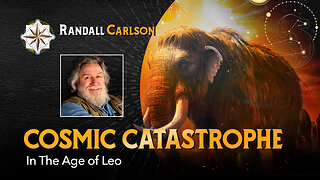Premium Only Content

Why is space dark while on earth we have light
Space appears dark primarily because it is a vacuum, devoid of matter, including air and dust particles, that would scatter or reflect light. Here's why space is dark:
Lack of Atmosphere: Earth's atmosphere scatters sunlight in all directions, creating a bright blue sky during the day and allowing us to see the Sun, Moon, stars, and other celestial objects. In space, there is no atmosphere to scatter sunlight, so it doesn't create a continuous glow.
Vast Distances: Space is incredibly vast, with vast distances between stars and galaxies. The light from distant stars has to travel immense distances to reach us, and it can become extremely dim by the time it reaches our telescopes or eyes.
Absence of Nearby Light Sources: Unlike Earth, where artificial lights, cityscapes, and the Sun illuminate our surroundings, space often lacks nearby light sources. Even stars are typically separated by large expanses of empty space, contributing to the overall darkness.
Cosmic Background Radiation: Space isn't completely devoid of radiation. There is a faint background radiation called the cosmic microwave background (CMB), which is a remnant of the Big Bang. However, this radiation is very low in energy and is not visible to the human eye.
Human Vision Limitations: Our eyes are adapted to perceive light within a certain range of wavelengths, known as the visible spectrum. Objects in space, like stars, emit light primarily in this range, but not all of it falls within our perception, which can contribute to the perception of darkness.
So, while space itself is not intrinsically dark, it appears dark to our eyes due to the absence of scattering, the vastness of space, and the limitations of our vision. In reality, space can be filled with a stunning array of celestial objects and phenomena, but their faintness and distance make them appear dim or dark to us without the aid of telescopes and specialized equipment.
-
 20:30
20:30
Exploring With Nug
1 day ago $3.01 earnedMissing Father of 2 FOUND Underwater In Shallow Pond!
20.4K6 -
 19:19
19:19
This Bahamian Gyal
1 day agoThe View PRAISES Michelle Obama for DITCHING TRUMP inauguration, "when they go LOW, go even LOWER"
18.4K28 -
 14:25
14:25
Degenerate Jay
21 hours ago $5.20 earnedThe Flash Movie Failed Because People Hate The Character? Sure.
60.7K11 -
 28:30
28:30
CharLee Simons Presents Do Not Talk
6 days agoSam Anthony from YourNews.com (with host CharLee Simons)
39.9K1 -
 52:34
52:34
PMG
17 hours ago $2.67 earnedHannah Faulkner and Steve Friend | EXPOSE THE FBI CORRUPTION - KASH PATEL
28.3K6 -
 25:33
25:33
marcushouse
1 day ago $37.99 earnedStarship Exploded! What Went Wrong? Flight Test 7 Explained
189K64 -
 1:00:50
1:00:50
Squaring The Circle, A Randall Carlson Podcast
1 day ago#035 Cosmic Catastrophe In The Age Of Leo - Squaring The Circle: A Randall Carlson Podcast
119K33 -
 1:33:14
1:33:14
Jamie Kennedy
1 day agoThe LA Fires...
96.6K27 -
 2:01:45
2:01:45
Quite Frankly
2 days ago"Inauguration Eve: Trump Time Travel Review" 1/17/25
74.3K65 -
 58:42
58:42
SGT Report
4 months agoYour REAL NEWS vs. CIA Mockingbird LIES -- Sam Anthony
200K99